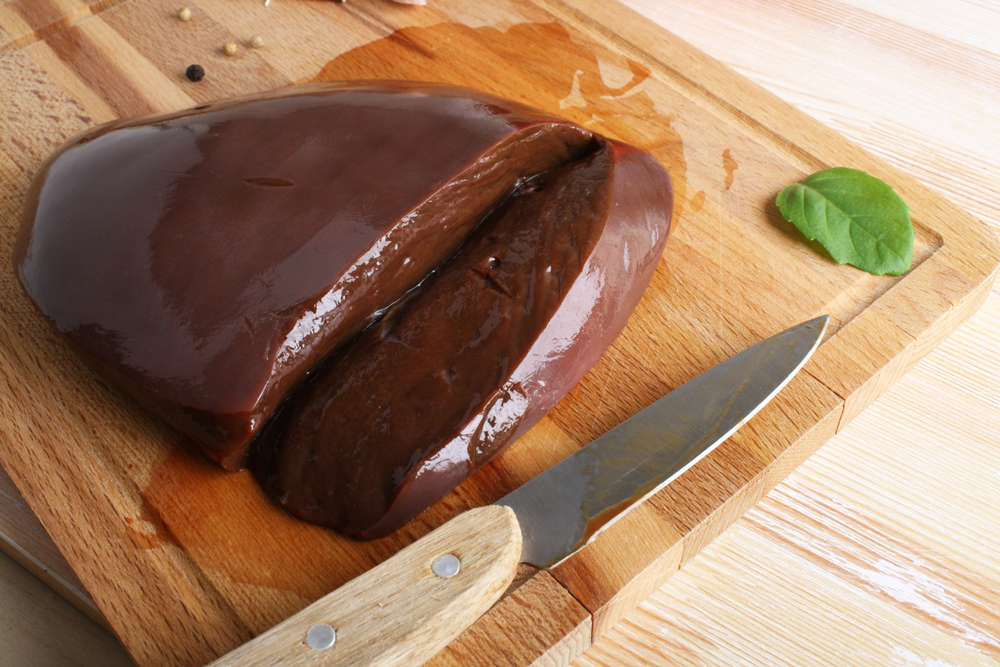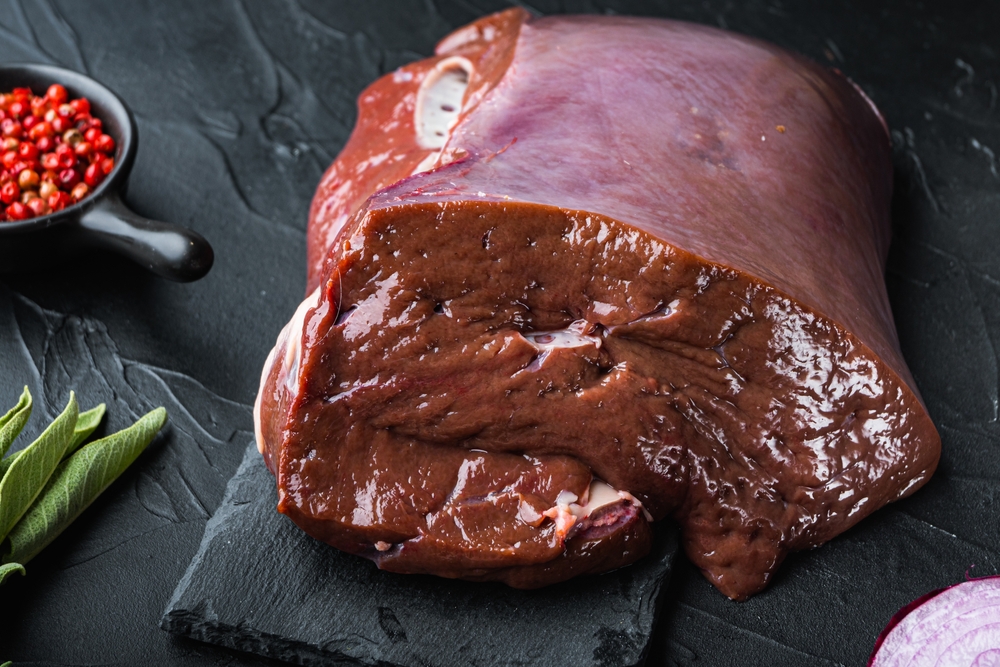Beef liver can support your weight loss efforts through its high protein content, metabolism-boosting B vitamins, and nutrient density that keeps you full on fewer calories—but only when consumed in moderation as part of a complete strategy.
You shouldn't eat it daily due to vitamin A toxicity risks, and it works best when limited to 1-3 servings per week alongside regular exercise and a balanced diet.
Keep reading to understand exactly how beef liver aids fat loss, how much you should eat safely, and the best ways to prepare it.
How Beef Liver's Nutritional Profile Supports Weight Loss
A 100-gram serving of beef liver delivers 191 calories, 29 grams of protein, and just 5.13 grams of net carbs.
That's more than a quarter of the serving weight coming from protein—all nine essential amino acids included as a complete protein source.
This calorie-to-nutrient ratio matters because you can eat less food while hitting your nutritional targets.
When you're in a caloric deficit for weight loss, you need foods that pack maximum nutrition into minimum calories.
Otherwise, you'll feel constantly hungry or develop nutrient deficiencies that tank your energy and metabolism.
The micronutrient concentration separates beef liver from typical protein sources:
- 2,917% of daily B12 needs
- 1,578% of daily copper
- 261% of daily riboflavin
- 104% of daily vitamin A
- 63% of daily folate
- 36% of daily iron
These aren't just impressive numbers on paper.
Each nutrient directly supports your weight loss process. B vitamins convert food into usable energy and speed up your metabolic rate.
Iron transports oxygen to your cells, which means better workout performance and more stamina throughout your day.
Folate influences hunger signals—people who consume more folate per calorie eat about 27% fewer total calories without trying.
Compare this to chicken breast, the go-to protein for most dieters.
While chicken gives you protein and little else, beef liver loads you with metabolism-supporting vitamins and minerals in every bite.
You get more nutritional bang for your caloric buck.
Here's why that density matters when you're trying to lose weight: your body craves nutrients, not just calories.
When you eat foods that satisfy your nutritional needs quickly, you naturally stop eating sooner.
You're not fighting constant hunger or dealing with low energy that makes you reach for snacks between meals.
The 5 Weight Loss Mechanisms of Beef Liver
Protein-Induced Satiety
High-protein foods keep you full longer than carbs or fats do.
Research from the University of Sydney found that all organisms continue eating until their protein needs are satisfied—your body prioritizes hitting that protein target above everything else.
Beef liver's protein content (over 29 grams per 100-gram serving) triggers stronger satiety signals than other macronutrients.
This translates to fewer cravings between meals, longer stretches before you feel hungry again, and easier adherence to the caloric deficit needed for fat loss.
You're not white-knuckling through hunger; you're genuinely satisfied on fewer calories.
Metabolic Enhancement Through B Vitamins
That 2,471% of daily B12 you get from beef liver directly accelerates how your body breaks down fats, carbohydrates, and proteins for energy.
Studies show an inverse relationship between B12 blood levels and obesity—people with obesity typically have lower B12 levels.
B vitamins convert the food you eat into usable energy rather than letting it store as fat.
Higher protein intake also increases thermogenesis, the calories your body burns just digesting and processing food.
You're essentially burning more calories around the clock without extra effort.
Micronutrient-Driven Hunger Reduction
Your body doesn't just crave calories—it hunts for specific nutrients.
When those needs go unmet, you keep eating even after consuming enough calories.
People who get more folate per calorie consume 27% fewer total calories on average because their nutrient-seeking behavior gets satisfied faster.
Beef liver floods your system with the exact micronutrients that shut off hunger signals.
The combination of iron and B12 drives red blood cell production, which improves oxygen transport to cells and keeps your energy steady throughout the day instead of crashing and reaching for snacks.
Thyroid Function Support
Your thyroid controls metabolic rate and body composition.
When it underperforms, weight loss becomes frustratingly difficult no matter how perfectly you eat or exercise.
Beef liver supplies iodine and selenium—two minerals required for thyroid hormone synthesis.
Selenium specifically acts as a component in over two dozen selenoproteins involved in thyroid hormone metabolism.
Optimal thyroid function means your metabolism runs at full capacity instead of slowing down and fighting your weight loss efforts.
Enhanced Physical Activity Capacity
More energy means more movement, and more movement burns calories.
The nutrients in beef liver—particularly iron, B vitamins, and complete protein—boost stamina for both planned workouts and everyday activities.
Simple daily tasks like walking, gardening, and household chores can burn roughly 800 calories through non-exercise activity thermogenesis.
That movement also builds lean muscle mass, which raises your resting metabolic rate.
You'll burn more calories even while sitting on the couch because muscle tissue requires more energy to maintain than fat tissue does.
How Much Beef Liver Should You Eat for Weight Loss?
Weekly target: 100-250 grams total, split into 1-3 servings
For most adults, that breaks down to 3-6 ounces (85-170 grams) per serving.
Never exceed 3.5 ounces (100 grams) in a single day, regardless of how you prepare it.
Moderation matters here despite beef liver's impressive nutritional profile.
Those sky-high vitamin A and copper levels that make it so beneficial also create toxicity risks when you overdo it.
Your liver stores vitamin A, and consistent overconsumption leads to accumulation that damages vision, bones, and other tissues.
Practical scheduling options:
- Minimum effective frequency: Once per week
- Maximum safe frequency: Three times per week
- Ideal approach: 2-3 servings of 85-100 grams each, spread throughout the week
If you're considering supplements instead of fresh liver, typical dosing runs 3-6 capsules daily.
That equals roughly 1-3 grams of dried liver powder—far less nutrition than a 100-gram fresh serving.
Freeze-dried supplements offer convenience for people who can't stomach the taste, but you're getting a fraction of the nutrient density.
These serving recommendations apply whether you eat liver raw, cooked, or in supplement form.
The vitamin A and copper content remains concentrated regardless of preparation method.
Sticking to these amounts lets you harvest the weight loss benefits—enhanced metabolism, better satiety, increased energy—without crossing into toxicity territory.
You're playing the long game here.
Consistent moderate intake beats aggressive daily consumption that forces you to quit due to side effects or health concerns.
Critical Safety Warnings You Must Know

Vitamin A Toxicity Risk
Beef liver contains preformed vitamin A (retinol), which your body absorbs readily and stores in your liver.
Just one ounce (28.5 grams) packs 2,650 micrograms—leaving you only 350 micrograms away from the 3,000-microgram safe upper limit for adults.
Animal-based vitamin A poses higher toxicity risk than plant sources because your small intestine absorbs it immediately and your liver stockpiles it.
Plant-based beta-carotene gets converted to vitamin A only as needed, so your body self-regulates intake naturally.
Toxicity symptoms include:
- Blurred vision and potential vision damage
- Persistent headaches
- Dry, flaking skin
- Hair loss
- Chronic fatigue
- Bone pain and deterioration
Daily consumption creates the biggest danger.
Eating beef liver every day forces continuous accumulation that your body can't clear fast enough.
Interestingly, occasional high doses prove safer than consistent moderate doses because your system gets time to process and eliminate the excess between servings.
Copper Overload Concerns
Beef liver contains more copper than any other food—12.2 milligrams (over 1,300% of recommended intake) in just a 3-ounce serving.
While your body normally eliminates excess copper efficiently, chronic overconsumption overwhelms this protective mechanism.
The result? Digestive issues in mild cases, potential liver damage in severe ones.
This directly contradicts your weight loss goals since you're eating liver specifically for metabolic benefits, not to create new health problems.
The weekly consumption limits protect you against copper accumulation.
Spacing out servings gives your body adequate time to process and excrete the surplus before the next dose arrives.
Special Population Warnings
Pregnant women should limit or completely avoid beef liver.
High vitamin A intake during pregnancy links directly to birth defects affecting the nervous and cardiovascular systems.
The risk isn't theoretical—it's documented and serious.
People with gout need to skip beef liver entirely.
The high purine content triggers flare-ups that cause intense joint pain and inflammation.
Anyone with existing liver conditions must consult their healthcare provider before adding beef liver to their diet.
Your compromised liver may struggle to process the concentrated nutrients and eliminate excess vitamin A and copper.
Children require even smaller portions than adults—once per week at significantly reduced serving sizes based on their body weight and age.
How to Prepare and Eat Beef Liver for Maximum Benefits
Flavor-Improvement Techniques
The overnight milk soak solves beef liver's biggest problem—that metallic, mineral-heavy taste that makes most people gag.
Submerge your liver in whole milk, refrigerate overnight, then discard the milk and pat the liver dry before cooking.
Milk works because it draws out the metallic flavor compounds that make liver so off-putting.
Lemon juice does the same job if you prefer a citrus approach to dairy.
Once soaked, dredge the liver in gluten-free flour, season generously, and pan-fry it with onions and garlic.
The aromatic vegetables mask whatever strong flavors remain, and the flour creates a crispy exterior that changes the texture completely.
Disguising Methods for Taste-Averse Individuals
Chop or mince beef liver and mix it with regular ground beef for burgers or spaghetti Bolognese.
Start with a 10-20% liver ratio and gradually increase as your palate adjusts.
The other meat dilutes the liver flavor while you still get the nutritional benefits.
If beef liver remains too intense, try calf or chicken livers first.
Both offer milder flavors that work as stepping stones toward tolerating beef liver's stronger taste.
Quality Selection and Food Safety
Choose grass-fed beef liver whenever possible.
It contains four times the phytonutrients of grain-fed versions plus higher omega-3 fatty acids for cardiovascular health.
Always cook liver to 160°F (71°C) internal temperature—this kills bacteria that cause foodborne illness.
Use a meat thermometer rather than guessing. Undercooked liver puts you at risk for infections that derail your weight loss progress through illness.
Supplement Alternative Considerations
Freeze-dried liver capsules offer an escape route if you absolutely cannot stomach the taste or preparation hassle.
These desiccated supplements provide convenience but come with tradeoffs.
Processing causes losses in heat-sensitive compounds, so you're not getting the full nutritional punch of fresh liver.
Nutrient content varies wildly between brands depending on the source animal's diet, age, and processing methods.
Look for third-party testing verification and quality sourcing information before buying.
Remember that typical dosing (3-6 capsules = 1-3 grams dried powder) delivers far less nutrition than a 100-gram fresh serving.
You're trading maximum benefits for palatability.
Setting Realistic Weight Loss Expectations with Beef Liver
Beef liver supports weight loss—it doesn't create it single-handedly.
No food does, no matter how nutrient-dense or metabolically beneficial.
Fat loss requires multiple simultaneous changes: eating fewer calories than you burn, moving your body regularly, sleeping adequately, managing stress, and staying hydrated.
Beef liver enhances several of these factors through better satiety, increased metabolism, and higher energy levels, but it won't override a poor diet or sedentary lifestyle.
Think of beef liver as a nutrient optimization tool that makes the weight loss process easier and more sustainable.
You'll feel fuller after meals, have more energy for workouts and daily activities, and your metabolism will run more efficiently.
Those advantages help you stick to your caloric deficit without feeling miserable, which is where most weight loss attempts fail.
Clinical evidence specifically for beef liver supplements and weight loss is essentially nonexistent.
Most claims rely on nutritional theory or assumptions that ancestral eating patterns automatically translate to modern health benefits.
The fresh liver research is stronger, but even there, the benefits come from incorporating it into a comprehensive strategy rather than treating it as a magic bullet.
Pair beef liver with:
- A balanced whole food diet focused on vegetables, quality proteins, and healthy fats
- Regular physical activity that includes both cardio and strength training
- Adequate daily hydration (your body needs water for every metabolic process)
Monitor your total vitamin A intake from all dietary sources, not just liver.
Multivitamins, fortified foods, and other animal products add up quickly.
Track your progress through body composition changes and energy levels rather than obsessing over the scale.
Increased muscle mass from better nutrition and exercise might keep your weight stable while your body fat percentage drops.
You'll notice better stamina, improved workout performance, and clothes fitting differently before you see dramatic scale changes.
Consistent moderate consumption—1-3 times weekly within the safety guidelines—offers the best balance of benefits and risk avoidance.
That frequency keeps you in the sweet spot where you're harvesting the metabolic advantages without accumulating dangerous levels of vitamin A or copper.
Conclusion
Beef liver delivers legitimate weight loss support through protein-driven satiety, metabolic enhancement, and concentrated nutrients that reduce hunger and boost energy.
Stick to 1-3 servings per week (100-250 grams total) to get the benefits without risking vitamin A toxicity or copper overload.
Combine it with regular exercise, a balanced diet, and realistic expectations—it's a powerful tool in your weight loss toolkit, not a miracle solution on its own.







